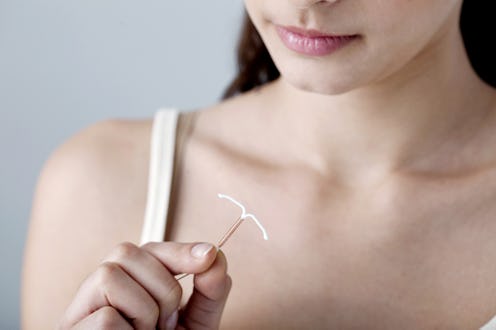Life
Why Isn't The IUD More Popular Yet?

Of all the long-term birth control options out there, intrauterine devices (IUDs) and hormonal implants are some of the safest and most well-recommended methods among health professionals. Why, then, are IUDs and hormonal implants still unpopular among women? In a country where abortion access is increasingly restricted, unwanted pregnancy is a terrifying prospect for many young women. Unfortunately, unintended or mistimed pregnancy makes up around half of all pregnancies each year, the vast majority of which are the result of incorrect use of birth control.
The obvious solution, of course, is to increase education surrounding and access to better contraceptives — a course of action which the American Congress of Obstetricians and Gynecologists recommends. Currently, the most reversible common forms in the United States are the pill and male condoms, both of which are associated with much higher failure rates than IUDs and hormonal implants with typical use. Think about it: The pill requires users to take the contraceptive at the same time every day for as long as they plan on using it, and the consequences of missing a few doses can be life-changing. Even with miraculously perfect use, one in 100 women still get pregnant on the Pill, compared to a failure rate of less than one percent with IUDs and hormonal implants.
Don't even get me started on the efficacy of male condoms as birth control, by the way — although they're great for protecting against STIs, condoms have a failure rate of 18 percent with typical use.
As the New York Times pointed out this week, studies have shown that long-acting contraceptives (LARC) like the IUD can be up to 20 times as effective in preventing pregnancy than the pill. Rather than relying on users to administer their own birth control, LARCs require just a single in-office procedure, but their use as a contraceptive lasts for three to ten years. Other than sterilization, the IUD and hormonal implant are the most effective forms of birth control out there; in fact, they're some of the most common forms of contraception used by female gynecologists.
Basically, what we can take away from this is that IUDs and implants are the best things to happen to women's sex lives since the modern vibrator, and I don't make that comparison lightly. So why are so few women using these forms of birth control?
There's no denying that an element of misinformation is at play; although the modern incarnation of the IUD has been around in some form or another since the 1960s, society's image of the IUD is still stuck in the era when poor-quality plastics rendered them nigh-ineffective. To make matters worse, a type of IUD known as the Dalkon Shield was infamous for pelvic infections that left some women infertile — an image that's proven hard to shake. When you add in the fact that IUD insertion is notoriously painful, it's not hard to see why women don't necessarily trust IUDs.
Surprisingly, however, doctors also have a hand in the unpopularity of LARCs. According to research, anywhere between one-third and half of women's health providers believe that IUDs are inappropriate for women who haven't had children, despite evidence showing that they're actually ideal for sexually-active teens and young women. As a result, misinformed doctors simply aren't recommending LARCs to the populations that would benefit the most from their use, which just contributes to the stigma surrounding IUDs.
This isn't to say that LARCs are perfect for everyone, of course, but there's no denying that they're a more effective and safer option than their reputation claims. On the bright side, IUD use finally increasing in the United States, albeit slowly — and I don't know about you, but I'm a fan of anything that gives women more control over their sex lives. With that in mind, I'll leave you with a viewing of Amber Rose's "Walk of No Shame," because it's hard to get more sex-positive than that.
Images: Liz Henry/Flickr, Giphy (2)
This article was originally published on